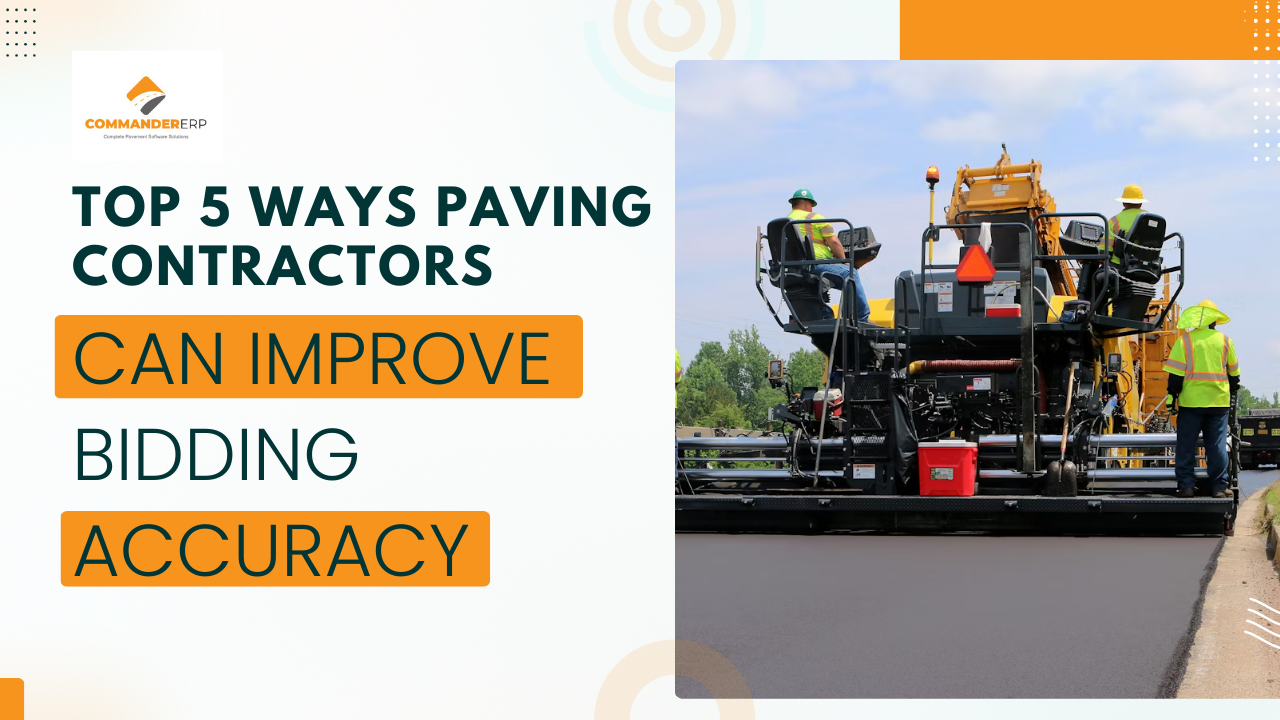
x
c
o
m
m
a
n
d
e
r
e
r
p
Blog
- Home
- Blog
- Commander ERP
- 2025-08-29
Top 5 Ways Paving Contractors Can Improve Bidding Accuracy
Are you spending hours on bids, only to lose projects to competitors, or worse, win jobs that end up draining your profits?
For paving and construction contractors, bidding is one of the toughest challenges. A bid that’s too high pushes clients toward competitors, while a bid that’s too low puts your margins and your reputation, at risk.
Add in fluctuating asphalt prices, rising fuel costs, and unpredictable labor needs, and suddenly, bidding feels more like gambling than planning.
This article is written for paving contractors, construction managers, and business owners who are tired of guesswork in their estimating process.
Whether you’re running a small paving crew or managing multiple projects across a region, improving your bidding accuracy can be the key to winning more jobs and keeping them profitable.
The good news? Bidding doesn’t have to be a gamble. With the right data, tools, and processes, contractors can cut down on wasted time, improve accuracy, and ensure every project sets the business up for success. Here are the top five ways to sharpen your bidding strategy.
1. Use Historical Job Data for Smarter Estimates
Every paving job you’ve completed in the past is a goldmine of information. Historical data like labor hours, material costs, and equipment expenses provides valuable benchmarks for future estimates. By studying past projects, contractors can identify patterns, such as recurring hidden costs or seasonal price shifts.
For example, if a project last summer ran over budget due to unexpected fuel use, that insight can be factored into future bids. Contractors who leverage this data are less likely to underbid and more likely to present realistic numbers that protect their margins.
2.Automate Material and Fuel Tracking
Material and fuel costs are two of the most volatile parts of any paving job. Asphalt prices can spike unexpectedly, and rising fuel costs can quietly drain profits. Contractors relying on manual tracking or outdated spreadsheets often struggle to keep up with these changes, leading to bids that don’t reflect true market conditions.
By using automated tracking tools, contractors can pull real-time data directly into their bids. This ensures every estimate reflects the most current costs of asphalt, gravel, and fuel. For instance, Commander ERP integrates live cost tracking, so contractors can build accurate bids without second-guessing. The result? More precise estimates that minimize financial risk.
3. Standardize Your Estimating Process
In many companies, different estimators use different methods, spreadsheets, or assumptions. This inconsistency leads to unreliable bids that vary in accuracy from one project to another. Standardization is the solution.
By using templates, predefined cost categories, and step-by-step estimating checklists, contractors can ensure that every bid goes through the same rigorous process. This reduces human error, saves time, and builds confidence in the accuracy of every proposal. A standardized process also makes it easier to train new team members without compromising quality.
4. Factor in Equipment Usage and Maintenance Costs
One common mistake in bidding is underestimating the true cost of equipment. Beyond fuel, every hour of machine usage adds wear-and-tear, which eventually leads to maintenance or replacement. Ignoring these hidden costs can cause bids to look profitable on paper but result in losses once the project begins.
Smart contractors account for equipment depreciation, preventive maintenance, and potential downtime in their bids. For example, tracking machine hours through an ERP system allows contractors to forecast when a piece of equipment may need servicing. This ensures bids include realistic equipment costs and prevents unpleasant surprises mid-project.
5. Adopt an Integrated ERP System for Real-Time Insights
Spreadsheets might work for small projects, but as your business grows, they quickly become inefficient and error prone. An integrated ERP system gives contractors real-time visibility into labor, materials, fuel, and fleet data all in one place.
With an ERP like Commander ERP, paving contractors can:
-
Pull accurate data instantly instead of guessing.
-
Compare estimated vs. actual costs for ongoing improvement.
-
Collaborate across teams without miscommunication.
-
Speed up the bidding process by eliminating duplicate data entry.
Contractors who embrace digital transformation often find they can submit bids faster, win more projects, and maintain healthier profit margins.
Conclusion
Bidding accuracy is not just about winning contracts; it’s about safeguarding profitability. By using historical data, automating cost tracking, standardizing processes, factoring in equipment usage, and adopting an integrated ERP system, paving contractors can take control of their bidding strategy.
In an industry where every dollar counts, the difference between a good bid and a great bid often lies in the tools you use. With solutions like Commander ERP, contractors can move away from guesswork and toward data-driven confidence, ensuring their bids are both competitive and profitable.



